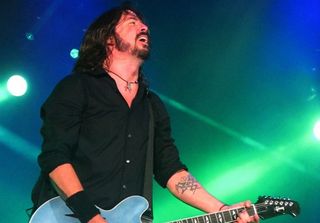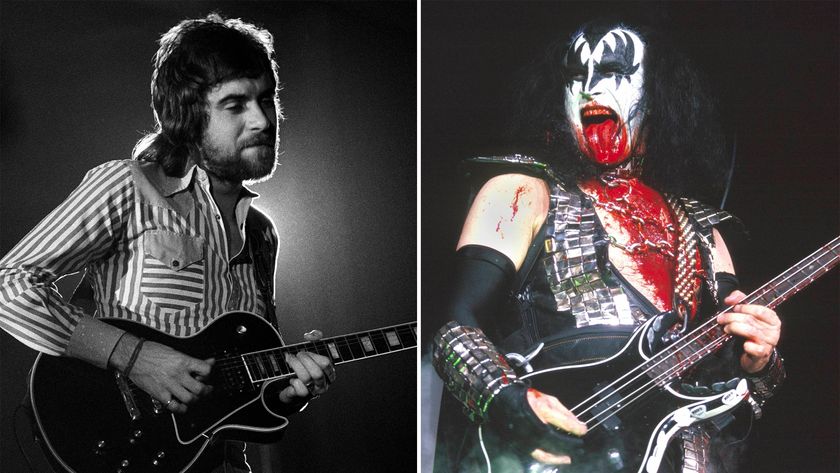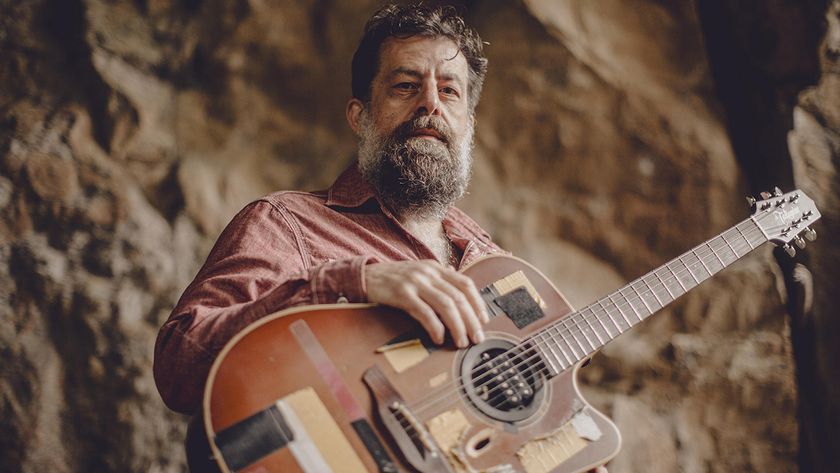From the Archive: Dave Grohl - How the Other Half Lives

This article was originally published in Guitar World Acoustic Magazine, 2005.
Dave Grohl and the Foo Fighers discover the delights of going unplugged on their 2005 double album, In Your Honor.
Dave Grohl calls himself “the luckiest guy in the world,” and who can blame him? Since he was 21 years old, Grohl has known nothing but success - first as the drummer with the rock colossus Nirvana and then, in the wake of that band’s tragic dissolution, as singer and guitarist with the Foo Fighters, who in a decade of existence have scored numerous platinum albums and hit singles.
But there’s little question that while he’s been lucky, Grohl has also been good—very good. Yes, he played with Kurt Cobain, but Grohl is no ordinary drummer; over the years, his distinctive, hard-hitting style has earned him a reputation as a latter-day John Bonham, landing him high-profile appearances with the diverse likes of Nine Inch Nails, Queens of the Stone Age and Cat Power.
And his work with the Foo Fighters has proven Grohl to be not only a skilled musician, but a first-rate songwriter as well. Foo tunes like “I’ll Stick Around,” “Monkey Wrench” and “All My Life” showcase both Grohl’s ability to compose melodically inventive riffs and chord progressions as well as what appears to be an endless supply of memorable pop-rock hooks.
Yet the fact is that, for all his clearly deserved success, Grohl remains surprisingly unsure of himself. “I have to admit,” he says, “that I thought every Foo Fighters album we made would be our last. We’d finish recording and I’d be like, ‘Okay, that was cool. But that’ll probably be the end of it. Now I can go get fat and bald and start having kids.’”
It’s the talk of an enduring pessimist, or perhaps of someone unable to believe that things have been going so well, for so long. “I never imagined the Foo Fighters would get anywhere near the same amount of attention and success as Nirvana,” says Grohl. “To still be here making music with my friends, playing enormous shows in front of tons of people and having a great time doing it - that’s incredible to me. From the first day this band got together I’ve been thinking, Wow, it doesn’t get any better than this. And it just keeps getting better.”
Get The Pick Newsletter
All the latest guitar news, interviews, lessons, reviews, deals and more, direct to your inbox!
While he is primarily an electric guitarist, Grohl explains that an acoustic guitar has always been his main writing tool. “Most of our songs, from ‘Everlong’ to ‘Monkey Wrench,’ “ he says, “were written on acoustic. I would bring the demos into the rehearsal space and then we’d plug in and dirty them up.”
As for his playing style, it shouldn’t come as a surprise that Grohl says he approaches the instrument “as if it were a drum kit. The low E is you kick, and the A and D strings are like a nice snare/tom combination. You can use the G string really prominently to fill up space like you would with a high-hat, and if you ring your B and high E strings over everything it gives you that nice high-end wash, like a crash cymbal.
“I’m not a flashy guitar guy, and I’m not a ripper,” he continues. “I can’t do that sort of thing. But I do enjoy finding chords that have no name, and I do enjoy writing riffs that are rhythmically a little complicated.”
Over the last few years you’ve built your own recording studio, wrote and recorded several discs of new material, directed a documentary and managed to contribute drum tracks to albums by, among others, Nine Inch Nails, Queens of the Stone Age and Garbage. Would it be accurate to describe you as a workaholic?
Perhaps, but the thing is, I don’t consider making music to be “work.” A lot of the stuff that comes along with it definitely is, but walking into a studio and jamming with some friends? That doesn’t seem like work at all—as much as I try to convince my wife that it is.
I have these great opportunities that come up day to day, and I’m going to take advantage of them. I talk about imagining each new album to be my last, but I know I’m not going to quit playing guitar or drums anytime soon. I look at a guy like Neil Young as a hero, and as such a good example of how to make a life out of making music. With that attitude it can last forever. I’m gonna be playing until I’m 112.
Your fifth album, In Your Honor was a double album. How did the idea for making it half acoustic, come about?
After we finished touring for the 2002’s One by One I thought, Okay, I’m in my mid-to-late-thirties now. Do I really want to run around festival stages screaming my head of every night? I don’t know, maybe it’s time to start playing some music [laughs]. So I thought that, rather than just jump back into the album cycle, I’d see if I could find a movie that needs a score.
One of my favorite albums of all time is Ry Cooder’s Paris, Texas [Cooder’s soundtrack to the 1984 Wim Wenders film of the same name]. I love that album—I’ve listened to it for years and years. So I envisioned finding a project that I could turn into my own Paris, Texas. After about a month of writing I thought, Wait a second, this could be a killer Foo Fighters record.
You’ve made big rock albums in the past—you have a pretty good idea of how to record them, and what they’ll sound like when they’re done. That wasn’t the case with the acoustic material on In Your Honor. How did the finished product compare to your original concept?
I really didn’t know what was going to happen with that album, and I think that’s why I consider it to be one of the best things we’ve ever done. We were in a panic when we recorded the acoustic record. We spent about two months on the rock disc, and then one day I thought, Okay, I know when our deadline is, and if we don’t start in on the acoustic album we might be fucked. Having never done anything like that before, I didn’t know how long it was going to take. So we had a little meeting where I sat everyone down and said, “Here’s what we have to do. Everyone has to be here all day, we need to do one song a day and no one’s leaving until that song is done.”And that’s what we did. I’d get in front of a mic, someone would put a click track in my headphones, we’d find a tempo and I’d just roll an arrangement off the top of my head. And as everyone else was putting their parts down, I’d sit in the corner writing lyrics. And we pulled it off. In two and half weeks we record 15 songs, of which we used 10. It was perfect. Rock bands—particularly hard rock bands—often fail when they go acoustic because they’re unable to alter their unusual approach. You saw that so often on MTV’s Unplugged.That’s totally true. When Nirvana performed on Unplugged we were very aware of that. We’d seen a lot of other shows where bands basically just strapped on some Ovations and played their songs exactly as if they were using their Kramers, you know? We tried to make it different, a little more delicate and mellow. And even making this new record with the Foo Fighters, there were times where the songs got dangerously close to turning into rockers. For example, Taylor [Hawkins] is an unbelievable rock drummer, and his first instinct is always to give you that 4/4 rock beat. But you have to rethink a lot of what you’re used to doing. There were times where I’d have to say, “Okay, I don’t think this one requires a whole drum kit. Could you just shake a tambourine or something?Unplugging a rock band can be risky business. Did you ever find yourself treading that line between sweetness and schmaltz?Yeah, it can be tough. Take a song like “Virginia Moon,” which is a bossa nova. That was brand new territory for us. At one point we put an organ on the song and it turned into something that you’d hear in an elevator. That one in particular could have gone south real quick.Lyrically, tracks like “Still” and “Friend of a Friend” have more of a singer-songwriter, storytelling approach than is customary in your material. “Still” is probably the first song I ever wrote that comes close to any sort of storytelling. It’s about my being a kid, going to the lake by my house on a Saturday morning and seeing all these ambulances and fire trucks because someone decide to kill himself by sitting on the train tracks. When you’re a child, you’re so naïve—you have no idea what’s really going on, and you start to explore and find yourself playing with pieces of the… it’s a pretty gory story, actually, but it happened.”How about “Friend of a Friend”? That song was written out of loneliness. When I first joined Nirvana, I moved from the east coast up to Olympia, Washington, and into this little apartment with Kurt. And it was just so quiet—there was nothing to do. It was winter, and it was dark, cold, wet and dirty. Just depressing. The only thing there was to do was sit on the couch and play acoustic guitar for, like, 10 hours a day. So I wrote that song about these two strangers—Kurt and Krist [Novoselic, Nirvana bassist]—that I’d just met. It’s basically about the three of us, at a time before Nevermind, before all of the fame and everything else. It’s the first song I ever wrote on acoustic.Are there any other acoustic songs from your past that found their way onto the album?The main riff in “Over and Out” is something I’ve been messing with for five or six years. And “Virginia Moon,” that’s about eight years-old. It’s just my lame attempt at recreating “The Girl From Ipanema.” We’d actually tried to turn that into a rock song back when we were making [1999’s] There Is Nothing Left To Lose, and it just sounded completely ludicrous. There was no way it would work.When playing electric you often incorporate ringing open strings into fretted chords to create drones and extended voicings. That stylistic device also lends itself well to the acoustic.I think that comes from listening to a lot of Alex Lifeson when I was a kid. As a drummer, I know that I should say Rush belongs to Neil Peart, but I kinda feel like Alex is the badass in that band. And using open notes in conjunction with fretted notes was a big thing with him. I love that sound, and it’s probably even more noticeable on an acoustic track, if only because the guitars aren’t drowned in cymbals and distortion.What is your acoustic setup in the studio?It tends to be real simple. There isn’t a lot of mucking up the signal path. We’ll put a Neumann microphone in front of the guitar and then run that into a Martech mic preamp, into the Neve or the API board and straight to tape.
.
Rich is the co-author of the best-selling Nöthin' But a Good Time: The Uncensored History of the '80s Hard Rock Explosion. He is also a recording and performing musician, and a former editor of Guitar World magazine and executive editor of Guitar Aficionado magazine. He has authored several additional books, among them Kurt Cobain: Montage of Heck, the companion to the documentary of the same name.

“Zal is really nobody’s guitar hero. Fans say he’s the most underrated player ever; many guitarists rate him amongst the best... but I’ve never heard anyone call him their ‘guitar hero’”: Billy Rankin on lessons learned from the legendary Zal Cleminson

“I had to use the same microphone that Gene Simmons used with all the blood coming out of his mouth. Can you imagine that!”: Mick Rogers recalls Kiss supporting Manfred Mann's Earth Band in their early days









